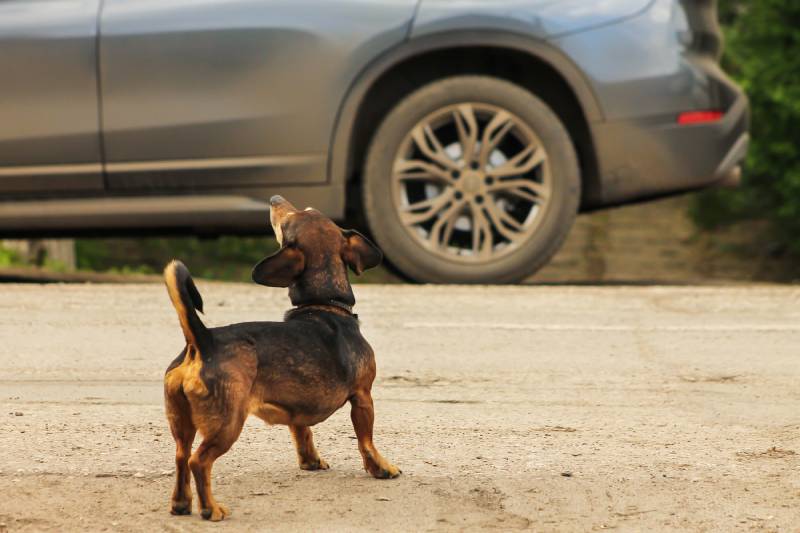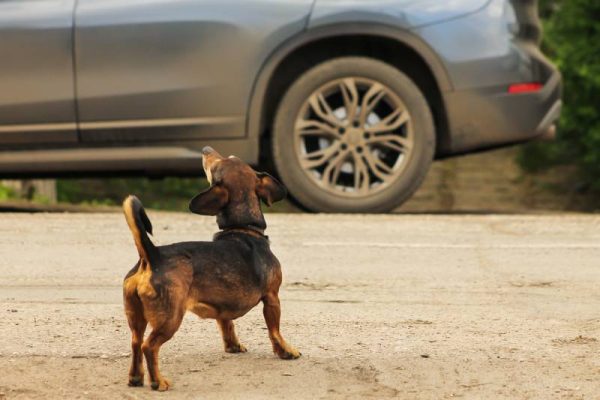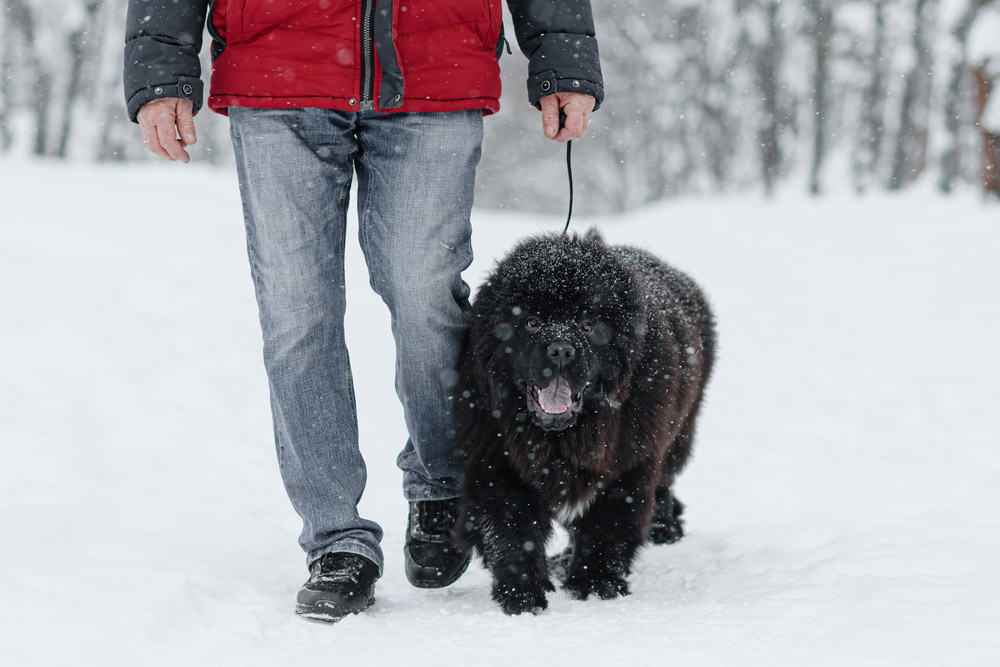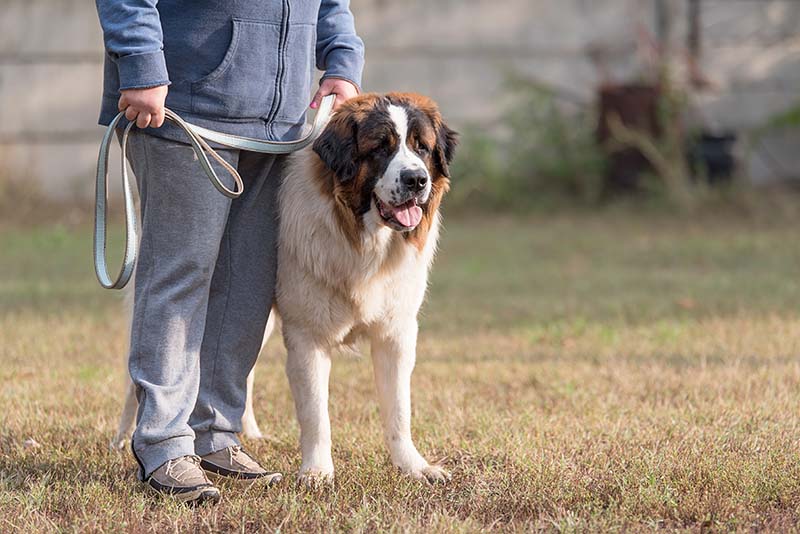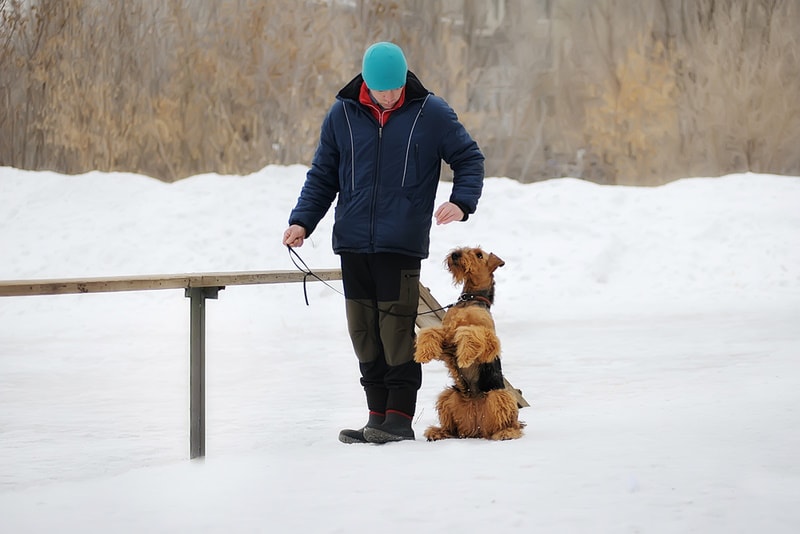Most owners adore getting out into the fresh air with their dogs and going for walks or shopping, but this joy can turn to dread if your dog is obsessed with barking at cars. Pulling, lunging, and barking behavior is disruptive and can be frightening for others, let alone stressful for you and your pup! Some dogs even bark at cars when they’re at home, making it unbearable. We’re here to help you tackle the issue and enjoy your walks with 10 tips to stop your dog from barking at cars.
The 10 Tips To Stop Your Dog From Barking at Cars
1. Keep Them on a Leash
If you’re out with your dog and you know they react to cars, the number one thing you can do before tackling the issue to keep them safe is to keep them on a leash. Some dogs will only bark and growl at cars, but others will run headlong into traffic; dogs do not understand how dangerous moving vehicles can be as they don’t know what they are. So, keep them safe by keeping them leashed around roads or areas with moving vehicles so you have peace of mind and can focus on training them to leave cars alone.
2. Use a Treat to Redirect Their Attention
Distraction is a great way to get your dog’s attention off the car and back onto you. If your dog has a treat they can’t resist, make a sound and show them the treat to capture their attention and guide them away from the situation. This technique works especially well if you redirect them just before the car passes or when they’re about to begin barking. It’s important to time the treat just right, as early treat-giving can accidentally reinforce the behavior you’re trying to stop!
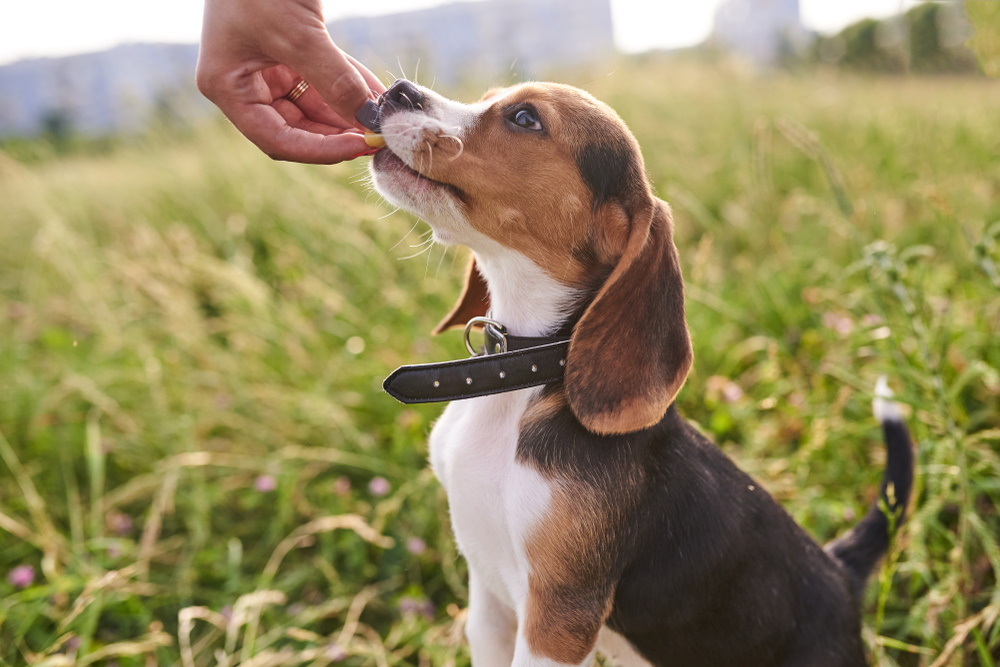
3. Bring Along Their Favorite Toy
Another great distraction is a toy, especially a squeaky one! Toys are great for not only distracting a dog from behavior like barking but also helping your dog destress and relieve anxiety and tension. A situation like barking at cars usually arises out of fear and will always come with an amount of stress, so using a toy can help them calm down and de-escalate.
4. Try the “Watch Me” Command
Using a command is ideal when dealing with problem behaviors like barking, and you can typically catch and stop the behavior with the command alone (with training). This method is known as counterconditioning. “Watch me” is a good command for this; it focuses your dog’s attention on you, getting them to maintain eye contact and watch your face rather than the car. “Watch me” is best taught in a calm and relaxed environment with no distractions and can be deployed in any situation where your dog may feel anxious or distracted.
Start the “watch me” command by holding a treat to the side and saying, “Watch me.” Your pup will stare longingly at the treat, but as soon as they stop and make eye contact with you, say yes or click with a clicker and give them the treat. Continue this until they consistently make eye contact first before moving on.
Continue with training but leave a longer gap between the eye contact and the treat, eventually removing the arm movement and keeping your dogs attention on you for longer periods. The key takeaway is shifting their focus away from something interesting or distressing (such as cars) and keeping it on you.
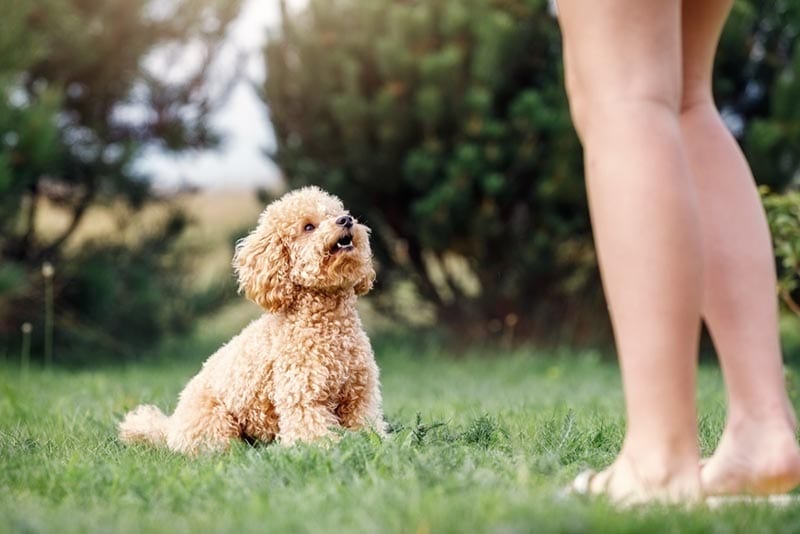
5. Know When to Reward
Once your dog has successfully been distracted away from the car and is looking away and not barking, give them a tasty treat. You can combine this with any of the methods mentioned above; it will teach your dog that not only are cars not interesting, but not barking and ignoring them will result in a treat. This may take some practice, but eventually, your dog should make this connection in their head and skip the barking altogether!
6. Avoid Heavy Traffic
If your dog is afraid of or anxious about cars, consider walking them in areas or at times where cars are less abundant. It can be challenging to do this if you live in a built-up urban area, but it’s worth altering your course or adjusting your walking schedule if your pup is barking up a storm. Some dogs can get overstimulated by a build-up of excitement and activity at home, and a bunch of cars during rush hour can send them over the edge. Others are simply adverse to vehicles in some way; in both cases, a more calm, less car-filled walk can sometimes curb the barking.
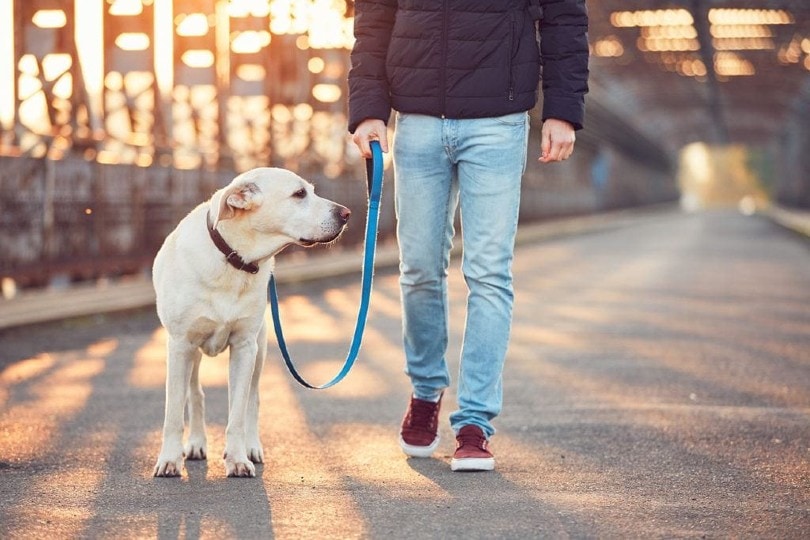
7. Be Consistent
Remember that consistency is vital, no matter which method you choose when stopping your dog from barking at cars. Dogs thrive off of routine, and they’ll be more comfortable if they can safely predict what’s coming next. Knowing which route you’re walking on means gaining a rough estimate of how many cars you might encounter. Plus, your dog is more likely to obey a “watch me” command if they know the reward is worth waiting for! Breaks in routine can cause dogs more stress which could set you back, so try to keep your “no barking at cars” training as consistent as possible.
8. Don’t Make a Fuss
If you’ve ever seen videos of dogs jumping up and down when their owner gets excited or getting close to them if they get upset, you’ll know that dogs often look to us for reassurance and guidance on how to act in a situation. Human body language and tone can directly affect a dog’s reactions and emotions; if you see them about to bark and you start shouting, they may well think, “Hey, I’ll join in!”.
This is also true for anxiety: if you get stressed out that your dog is about to go crazy at a car, they’ll likely feel the same way. Try to keep the situation as calm as possible and don’t make a fuss; if your dog is successfully distracted, reward them calmly but with lots of praise. If they aren’t, simply try again.

9. Increase Mental & Physical Stimulation
Sometimes, unwanted behaviors such as problem barking can be resolved by letting your dog burn off excess energy. If dogs are mentally or physically understimulated, they may begin to exhibit unwanted or negative behaviors such as barking, digging, etc. Studies have shown that dogs who receive enough exercise and positive outlets are often less anxious or fearful, so providing your dog with a long play session or tiring them out before walking them back along the road home can do wonders for their tendency to bark at cars.
10. Try Sports
If you have a dog that chases and barks at cars, they could be prime candidates for dog sports that involve chasing and hunting “prey.” Lure coursing and sports that involve pursuing a moving object in a controlled and fun way can help to scratch your pup’s primal itch to “get it” while providing some exercise and freedom to run.
This won’t be the case for all dogs, but it can be a great outlet for dogs with a penchant for chasing. Running after small (or big) things is natural for dogs, but some are more inclined to indulge.
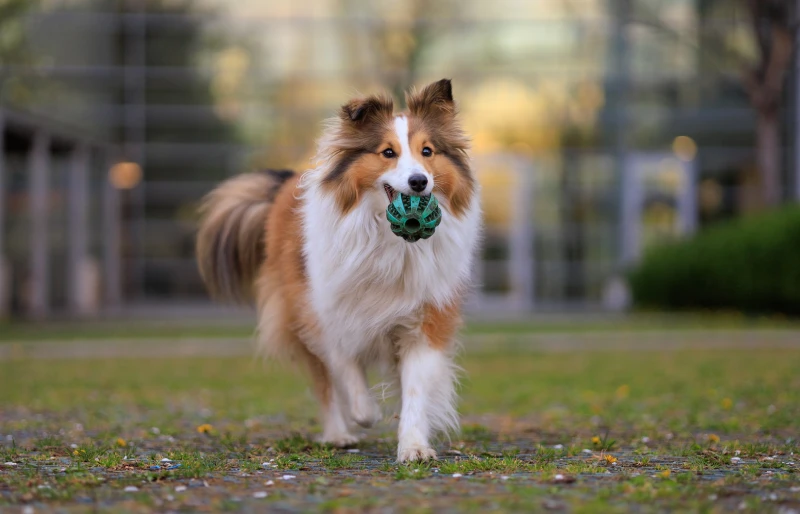
Why Do Dogs Bark at Cars?
There are a few reasons why your dog might constantly bark at cars, but most stem around your dog fulfilling a need. Some dogs will indulge their natural chase instinct, while others will have developed a fear or anxiety around cars that they express through barking. Some dogs will even bark at this perceived threat to try and deter them from approaching their family (protective barking), similar to how some dogs bark at the mailman.
Unfortunately, barking at cars is a common behavior, and it’s self-reinforcing because cars almost always drive away. If your pet wants to tell the car to “back off!” by barking, and the car drives away, your dog thinks that the barking worked (and does it again). Finally, some dogs are just bored on their walk or at the window, and barking at cars is something to do. These dogs need some entertainment and brain games!
Final Thoughts
Not all dogs will have a reason behind why they bark at cars, whereas others will bark due to anxiety, fear, or boredom. Knowing how to correctly distract and redirect your dog from the source of the agitation and keeping their attention long enough to praise them is the first step to teaching them that cars aren’t a big deal and certainly not big enough to bark at. With persistence and consistency, your dog should be able to ignore cars successfully, and you can enjoy your walks along the street with them stress-free.
Featured Image Credit: alignedd, Shutterstock
Contents
- The 10 Tips To Stop Your Dog From Barking at Cars
- 1. Keep Them on a Leash
- 2. Use a Treat to Redirect Their Attention
- 3. Bring Along Their Favorite Toy
- 4. Try the “Watch Me” Command
- 5. Know When to Reward
- 6. Avoid Heavy Traffic
- 7. Be Consistent
- 8. Don’t Make a Fuss
- 9. Increase Mental & Physical Stimulation
- 10. Try Sports
- Why Do Dogs Bark at Cars?
- Final Thoughts

